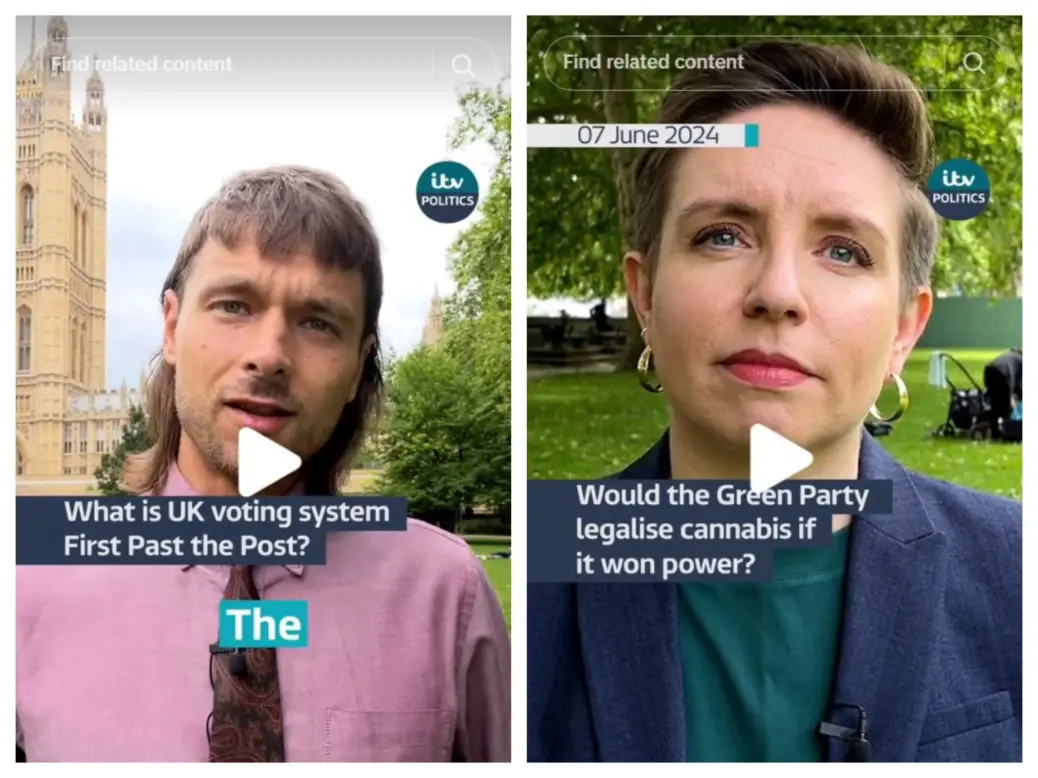
This is the first entry in a new election diary in collaboration with ITN. Insights will come twice a week from across the ITV News, Channel 4 News and Channel 5 News teams.
People come to Tiktok for the memes, but stay for the politics. Well, it’s my job to try and make sure that happens.
This has been called the first Tiktok election, and that was proven when all the main political parties joined the platform within days of the national poll being called.
It’s one of the world’s most used social media apps, and it’s where many young people spend most of their spare time, so it makes sense that it’s where much of the campaign is taking place.
ITV News has been on Tiktok a while but this year we evolved our strategy and became one of the first established news organisations to set up a Tiktok account dedicated to politics, to keep people informed in an election year on a platform where misinformation can run rife.
We wanted to keep people informed, with the same trusted news they expect from our website and TV bulletins. I was hired as the man to do that job.
It’s been a rollercoaster. The plan was to build a following before a general election in “the second half of the year”. We didn’t expect it to be on the first week of the second half of the year.
‘Young people more interested in politics than I expected’
But we were ready. Young people are a lot more interested in politics than I expected. Since the end of January, we’ve gained 100,000 followers and our videos have been seen almost 50 million times.
Of course, the many gaffes this year have been great content for the account but our explainers and original content are regularly seen being viewed by millions of people.
Videos on what many might think are the dull topics of First Past the Post and Purdah have been viewed almost a million times.
The government’s advice for emergencies, a much more exciting topic, has more than 1.6 million views.
But Tiktok isn’t just a platform for sharing our content, we also use it to talk to our audience.
During the campaign we’ve been asking our followers to send in questions, which we then put to the leaders.
So far our interviews with Ed Davey and Carla Denyer have been viewed almost three million times, with answers on electoral and drug reform getting the most traction.
ITV News on Tiktok: ‘We love getting views but we don’t forget who we are’
We love getting lots of views, but we don’t forget who we are. At ITV News, we hold our social media content to the same Ofcom standards that are required for our TV output, so there’s a balance to strike on tone and style.
Content needs to be impactful from the beginning, to stop people scrolling past, but it’s also important not to sensationalise. In a nutshell, it must be accurate, impartial, and concise.
Brevity is particularly important and difficult to master. A Tiktok must be long enough to include all the relevant information, and to the point enough to keep people’s attention.
But voter apathy this election suggests politicians must also do more to keep their attention – because people are losing interest in politics.
Many people I’ve spoken to this campaign have told me they have no trust in politics, that the system is broken, and all politicians are the same.
That’s despite the parties making a huge effort to reach them on social media.
Labour has gained 190,000 followers and 4.4 million likes on Tiktok since launching on 23 May. The Conservative Party has gained just 58,000 followers and its videos have been liked 457,000 times.
Despite both of their best efforts, young people are uninspired by politics.
Barely any of the young people I spoke to in Manchester after the ITV debate had watched it live on TV. Most however had seen clips on social media.
So it shows there is a role for trusted news organisations bringing news to young people on these platforms, even if many of them don’t plan to vote in this year’s general election.
Almost a fifth of young people who are eligible to vote in this year’s general election are unlikely to take part, a survey by the Duke of Edinburgh award found this week.
Just four in ten of those aged 18 to 24 said they are likely to cast their ballot on 4 July, around 43% said they were still questioning whether to vote and 18% said they are unlikely to.
And even more discouragingly, recent polling by Techne UK found that 20% of all Britons have already decided not to vote.
The parties will be doing what they can to change that before 4 July – and you can see the best of it on our Tiktok.
Email pged@pressgazette.co.uk to point out mistakes, provide story tips or send in a letter for publication on our "Letters Page" blog
